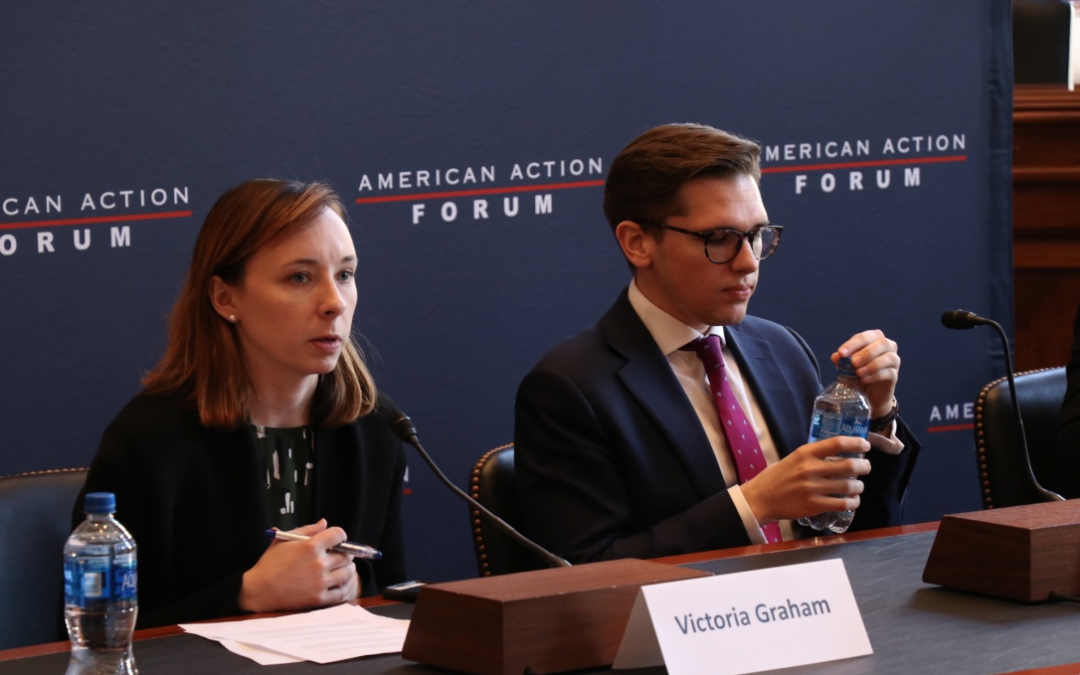WASHINGTON — Holding tech giants like Facebook, Google and Amazon accountable for how they collect and story users’ data as well as how they dominate the industry should be done through oversight by federal agencies rather than sweeping data privacy laws like those recently enacted by the European Union, several technology experts said Tuesday.
Last year, Facebook founder and CEO Mark Zuckerberg testified in front of Congress after it was discovered that Cambridge Analytica, a political consulting firm with ties to the Trump campaign, had harvested the data of millions of Facebook users, raising questions about privacy and regulation within the technology industry.
At a American Action Forum event, Tuesday, Ryan Hagemann of the Niskanen Center said the best way to approach the problem is through a “soft law” approach, which encompasses multiple agencies that oversee the industry through de facto governance. He said there are several challenges in regulating the technology industry, which includes identifying the involved actors.
“There is a sense that something is wrong and something should be different despite the difficulty to pinpoint the blame on certain individuals,” Hagemann said.
He added that there is a misconception about “big tech” companies, because technology is everywhere in today’s world, making it hard to draw a line that targets just one type or size.
Sen. Elizabeth Warren, D-Mass., and several other Democratic presidential candidates have laid out plans to better regulate tech companies.
Warren said at a CNN town hall on Monday that she would have the Justice Department force Facebook, Google and Amazon to sell off recent acquisitions and would prohibit them from buying or selling their own products in marketplaces they control, which is common on Amazon.
Chilson criticized Warren’s proposed anti-trust attacks on technology companies as ineffective means of protecting consumer privacy.
Caleb Watney of the right-leaning R Street Institute called anti-trust legislation a “last resort” solution because of the risk it poses to innovation. If Warren and other Democrats are wrong and they break up companies like Amazon and Facebook, then they could break up the companies that are producing much of innovation in the U.S. economy, he said.
Chilson said that the best course of action for the U.S. to maintain the status-quo and allow the Federal Trade Commission to litigate the gray areas in regulation while the private sector promotes competition for consumer privacy with tools like ad blockers.
The European Parliament and Council agreed upon the General Data Protection Regulation in April 2016, which went into action last year. The agreement is designed to enhance consumer and personal privacy online with new guidelines on notice, consent and anonymity online.
Experts at the discussion raised concerns about the application of such a sweeping regulation in the United States. Neil Chilson, a senior research fellow at the Charles Koch Institute, brought up the different speech freedoms between European countries and the United States.
“If you just cut and paste the GDPR into the U.S., it would look really different in its effect on businesses. It would be much more onerous than it is in Europe,” he said.
California followed in the footsteps of Europe by signing the California Consumer Privacy Act of 2018 into law. Most of its regulations, which go into effect in early 2020, will significantly limit what companies can do with consumer data.
A survey from TrustArc, a private compliance company that follows the CCPA and GDPR, revealed that 86 percent of the companies that responded have not completed preparations to be compliant with the new state regulations.
Watney called anti-trust legislation a “last-resort” solution because of the tremendous risk it poses to innovation. If Sen. Warren and other Democrats are wrong and they break up companies like Amazon and Facebook, then they could break up the few companies that are producing the “lion’s share” of innovation in the U.S. economy, he said.

